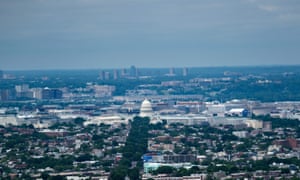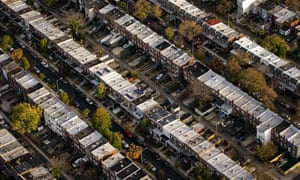DC has been trying to make its case to join the union for decades as its residents have long found themselves in a constitutional black hole

Photograph: Brendan Smialowski/AFP/Getty Images
Paul Strauss was a 29-year-old activist when Washington, District of Columbia (DC) last had a shot at becoming the 51st state in the United States of America. He sat in the chamber as the Democratic-controlled House of Representatives defeated the statehood bill by an almost 2-1 margin in 1993.
“I was very disappointed and very frustrated,” recalls Strauss, now 56 and the “shadow” senator for DC. “I really felt that we could do a lot more and I’ve been pushing the boulder uphill ever since.”
Twenty-seven years later, DC’s bid for statehood returns to the House on Friday with far brighter prospects. Democrats, again in the majority, are expected to actually pass the bill this time, arguing that statehood has gained importance in the aftermath of protests for racial justice in Washington and across the US.
It will not be mission accomplished since the legislation then faces insurmountable opposition in the Republican-controlled Senate. But should Democrats regain the Senate in November, DC will move closer to becoming the first state to join the union since Hawaii in August 1959.

It has been trying to make its case for decades. Although at just 68 sq miles (176 sq km) DC is hard to find on maps, its population of just over 700,000 is bigger than than Wyoming’s and Vermont’s. Yet while famed as the most powerful capital city in the world, paradoxically its residents have long found themselves in a constitutional black hole.
Uniquely disenfranchised, they could not even vote for US president until 1964 and, alone among national capitals in the democratic world, they are still denied a vote in their national congress or parliament. DC residents pay more per capita in federal income taxes than any state but Congress controls the city’s budget and can override its laws and withhold funds.
Statehood would finally give DC one voting member of the House and two in the Senate, which may explain Republicans’ staunch opposition. Senator Edward Kennedy once described the arguments against statehood as the “four too’s”: a fear that DC would be too black, too urban, too Democratic and too liberal.
The African American population of DC is now just under half and the city remains overwhelmingly Democratic: Hillary Clinton won 91% of the vote in the 2016 presidential election against Donald Trump’s 4%. The president vowed last month that “DC will never be a state”, telling the New York Post: “They want to do that so they pick up two automatic Democrats – you know it’s 100% Democrat, basically – so why would the Republicans ever do that?”
The statehood campaign was already gathering momentum this year, with backing from numerous Democratic candidates for president, but the police killing of George Floyd, an African American man in Minneapolis, gave added impetus. As protests swelled in the capital, Trump ordered armed federal forces into DC against the will of the mayor, Muriel Bowser.
Susan Rice, a former national security adviser who grew up in DC and supports statehood, wrote in the New York Times: “For one long week, Mr Trump transformed my hometown into a war zone to burnish his ‘law and order’ credentials. Without statehood, Washington was virtually powerless to prevent Mr Trump from using the capital as a petri dish to intimidate protesters, divide Americans and goad activists into ugly street battles to galvanize elements of his base.”
It was Trump’s controversial use of federal security forces to clear Lafayette Square near the White House of peaceful protesters, allowing him to stage a photo op outside a historic church, that proved the catalyst for Democratic leaders to schedule the vote. The majority leader, Steny Hoyer, presented by Bowser with a US flag bearing 51 stars, said “this was an appropriate time to bring a bill forward to show respect for the citizens of the District of Columbia”.
The DC statehood campaign has long been seen as an extension of the civil rights movement and could spur activists in Puerto Rico and other US territories. Strauss, who as shadow senator was forced to watch Trump’s impeachment trial from the public gallery, said: “Washington DC’s disenfranchisement has always had its roots in systemic racism. The fact that all of the nonvoting parts of the United States have majority non-white populations is more than just a coincidence.”
DC would also get a new name: Washington, Douglass Commonwealth, which honors the abolitionist Frederick Douglass, a denizen of the city, and could still be written as Washington DC for short.
“Frederick Douglass was a Washington DC resident, an elected official – he served as recorder of deeds here – and so if we’re going to keep the name of a slave owner [George Washington], let’s at least balance it out with an emancipated slave,” said Strauss.
The DC statehood campaign now resonates nationally, campaigners say, in part because Trump and the Senate have become guardians of minority rule. Meagan Hatcher-Mays, director of democracy policy for the grassroots group Indivisible, said: “People on the left are waking up to this issue, not as a fringe weird thing – like why does a small town want statehood? – but really as a matter of democracy.”
“Trump is really being aided and abetted by an anti-democratic Senate. It’s an institution that disproportionately represents small rural states that are an ideological minority in this country. Meanwhile, 700,000 people who live in the District of Columbia, most of whom are not white, do not have any representation in the Senate at all, let alone a vote.”
Hatcher-Mays, formerly an aide to Eleanor Holmes Norton, the sole DC non-voting delegate in the House, added that the Black Lives Matter protests, where Trump was “able to effectively declare martial law in DC”, also played a part. “It becomes not just a matter of democracy, but it becomes a racial justice issue, too. I think that really sealed it for a lot of people in a way that it hadn’t been a priority for people before.”



